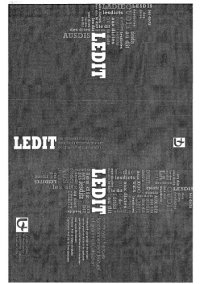
Ebook: Ledit in Middle French: Textual function and grammaticalization
Author: Jesse Mortelmans
- Year: 2009
- Publisher: Universiteit Antwerpen
- City: Antwerpen
- Language: English
- pdf
This thesis offers an analysis of the nature and evolution of the determiner ledit [the aforesaid] in Middle French prose texts. In Middle French (XIVth-XV th century), the anaphoric expression ledit was a genuine determiner. Its use was not restricted to legal jargon (as was the case in Old French and is the case today), and it actually occurred as a determiner in a wide variety of Middle French prose texts. The purpose of this research is to examine the function and the development of ledit in relation to the definite article le and to the different paradigms of the demonstrative determiner. The corpus consists of XIV th and XVth century French chronicle texts.
Recent studies on ledit in Modern French have identified this referring expression as a purely anaphoric device determining secondary discourse participants in less salient grammatical functions. However, analysis of the use of ledit in Middle French chronicles reveals that its function is to highlight primary discourse participants in salient grammatical functions, and leads to the conclusion that (i) the use of ledit, despite its explicitly anaphoric sense, exhibits aspects of both definite articles and demonstrative determiners; and (ii) the use of ledit appears to evolve in a way similar to the grammaticalization process of definite determiners.
To explain why ledit appeared so frequently in Middle French prose texts, I will draw an analogy with the situation in Late Latin (IInd-VIth centuries): both languages feature a frequent use of metalinguistic determiners (i.e. determiners of the type the aforesaid) at some point in their otherwise rather similar grammaticalization processes of the determiners. Initially, the metalinguistic determiners fulfilled a concrete, circumscribed task within the paradigm of the determiners. The reanalyses of the paradigms of the demonstrative determiners in both languages, however, led to a more frequent use of the metalinguistic determiners (in a wider range of contexts). As a result, the metalinguistic determiners grammaticalized into more common referential determiners in both Late Latin and Middle French, until the reanalysis process of the demonstrative determiners was completed and made their use redundant.
Recent studies on ledit in Modern French have identified this referring expression as a purely anaphoric device determining secondary discourse participants in less salient grammatical functions. However, analysis of the use of ledit in Middle French chronicles reveals that its function is to highlight primary discourse participants in salient grammatical functions, and leads to the conclusion that (i) the use of ledit, despite its explicitly anaphoric sense, exhibits aspects of both definite articles and demonstrative determiners; and (ii) the use of ledit appears to evolve in a way similar to the grammaticalization process of definite determiners.
To explain why ledit appeared so frequently in Middle French prose texts, I will draw an analogy with the situation in Late Latin (IInd-VIth centuries): both languages feature a frequent use of metalinguistic determiners (i.e. determiners of the type the aforesaid) at some point in their otherwise rather similar grammaticalization processes of the determiners. Initially, the metalinguistic determiners fulfilled a concrete, circumscribed task within the paradigm of the determiners. The reanalyses of the paradigms of the demonstrative determiners in both languages, however, led to a more frequent use of the metalinguistic determiners (in a wider range of contexts). As a result, the metalinguistic determiners grammaticalized into more common referential determiners in both Late Latin and Middle French, until the reanalysis process of the demonstrative determiners was completed and made their use redundant.
Download the book Ledit in Middle French: Textual function and grammaticalization for free or read online
Continue reading on any device:

Last viewed books
Related books
{related-news}
Comments (0)